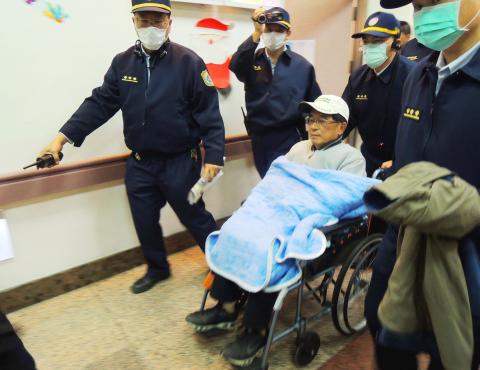The Taiwan High Court yesterday rejected former president Chen Shui-bian’s (陳水扁) application for medical parole, saying his case should be taken up in the administrative court.
The High Court added that the decision could be appealed in the Supreme Court.
The judges said Chen’s parole case relates to his treatment at prison facilities controlled by the Ministry of Justice’s Agency of Corrections, so it comes under the jurisdiction of the administrative authority.

Photo: Tsai Shu-yuan, Taipei Times
Therefore, the case should be taken up at the administrative court and be submitted as administrative litigation, the judges said.
Chen filed a motion of objection to the High Court on Thursday, penning the legal complaint himself, following a suggestion by Minister of Justice Luo Ying-shay (羅瑩雪) on Monday.
The High Court said that under Article 484 of the Criminal Code, a motion of objection can only lodged against the improper execution of duties by prosecutors. The case was not handled by prosecutors and therefore there was no grounds for a motion of objection, the court said.
On June 10, Chen applied for medical parole with the ministry, but the Agency of Corrections rejected his application, ruling that he did not meet the qualifications for medical parole.
The ruling was carried with the stipulation that the decision could be appealed through the courts.
Chen appealed by filing a motion of objection to the Taipei District Court on Nov. 11.
The District Court rejected the motion in a decision on Nov. 26, saying that the case was not within its jurisdiction.
In a press conference on Monday, Luo openly encouraged Chen to file another application for medical parole, saying it had been six months since his initial medical diagnosis for his current parole bid.
Luo said that for the second application, the Agency of Corrections should consider expanding the panel of experts for the review process to include medical professionals and doctors recommended by Chen’s family.
The latest decision by the High Court again denied Chen’s release from prison to serve the rest of his sentence under medical care at home.
Earlier yesterday, Luo said her suggestion was not an attempt to instruct the judiciary on how to handle Chen’s parole case.
“It is a very odd thing that the media are saying that I was giving instructions. The decision [by the Taipei District Court] was clear, where it said the case was in the wrong jurisdiction, and the decision can be appealed,” she said.
Luo added that she does not know how long the medical parole review process will take, and that the panel has not set a position one way or another.

Seventy percent of middle and elementary schools now conduct English classes entirely in English, the Ministry of Education said, as it encourages schools nationwide to adopt this practice Minister of Education (MOE) Cheng Ying-yao (鄭英耀) is scheduled to present a report on the government’s bilingual education policy to the Legislative Yuan’s Education and Culture Committee today. The report would outline strategies aimed at expanding access to education, reducing regional disparities and improving talent cultivation. Implementation of bilingual education policies has varied across local governments, occasionally drawing public criticism. For example, some schools have required teachers of non-English subjects to pass English proficiency

‘FORM OF PROTEST’: The German Institute Taipei said it was ‘shocked’ to see Nazi symbolism used in connection with political aims as it condemned the incident Sung Chien-liang (宋建樑), who led efforts to recall Democratic Progressive Party (DPP) Legislator Lee Kun-cheng (李坤城), was released on bail of NT$80,000 yesterday amid an outcry over a Nazi armband he wore to questioning the night before. Sung arrived at the New Taipei City District Prosecutors’ Office for questioning in a recall petition forgery case on Tuesday night wearing a red armband bearing a swastika, carrying a copy of Adolf Hitler’s Mein Kampf and giving a Nazi salute. Sung left the building at 1:15am without the armband and apparently covering the book with a coat. This is a serious international scandal and Chinese

TRADE: The premier pledged safeguards on ‘Made in Taiwan’ labeling, anti-dumping measures and stricter export controls to strengthen its position in trade talks Products labeled “made in Taiwan” must be genuinely made in Taiwan, Premier Cho Jung-tai (卓榮泰) said yesterday, vowing to enforce strict safeguards against “origin laundering” and initiate anti-dumping investigations to prevent China dumping its products in Taiwan. Cho made the remarks in a discussion session with representatives from industries in Kaohsiung. In response to the US government’s recent announcement of “reciprocal” tariffs on its trading partners, President William Lai (賴清德) and Cho last week began a series of consultations with industry leaders nationwide to gather feedback and address concerns. Taiwanese and US officials held a videoconference on Friday evening to discuss the

PERSONAL DATA: The implicated KMT members allegedly compiled their petitions by copying names from party lists without the consent of the people concerned Judicial authorities searched six locations yesterday and questioned six people, including one elderly Chinese Nationalist Party (KMT) member and five KMT Youth League associates, about alleged signature forgery and fraud relating to their recall efforts against two Democratic Progressive Party (DPP) legislators. After launching a probe into alleged signature forgery and related fraud in the KMT’s recall effort, prosecutors received a number of complaints, including about one petition that had 1,748 signatures of voters whose family members said they had already passed away, and also voters who said they did not approve the use of their name, Taipei Deputy Chief Prosecutor